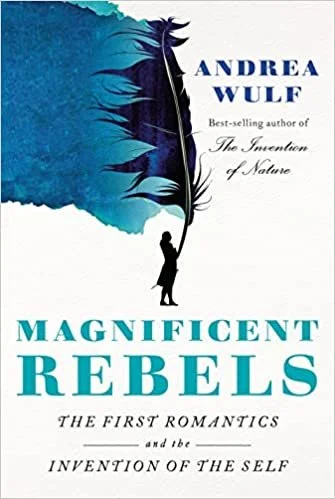Magnificent Rebels by Andrea Wulf
/Magnificent Rebels: The First Romantics and the Invention of the Self
By Andrea Wulf
Knopf, 2022
Readers who enjoyed Andrea Wulf’s previous book, The Invention of Nature, despite the fact that it was a 600-page biography of German naturalist Alexander von Humboldt, may be fretful about her new book, Magnificent Rebels, which is a 500-page study of a group of German intellectuals in the town of Jena in the 1790s, but not because the subject is recondite, far from it — if Wulf can make Alexander von Humboldt interesting, she is a duck to water in all matters recondite.
No, the fretting might arise from the fact that one of those German intellectuals was, inevitably, Goethe. Protective readers may worry that Wulf, perhaps still intoxicated by her success with the good naturalist, might fall prey to the same siren-song that has called to writers and other intellectuals for over 200 years: the urge to make Goethe interesting to a non-German audience.
The rest of the world is willing, one might even say compelled, to grant the man’s towering status as a writer, a thinker, a poet, a travel brochurist, and a dab hand at an apothegm. But interesting? To readers innocent of a word of German? No, we cannot go so far — and no biographer, historian, or editor has yet succeeded in bridging this awful gap.
Fortunately, her good sense saves her; in these pages, she sticks Goethe (who only visited Jena, after all, but never actually signed a lease in town) firmly in the midst of a big cast — and because no other member of that cast is as obdurately monumental as Goethe (the only one who comes close is the poet Novalis), the larger narrative of Magnificent Rebels is saved.
In fact, the larger narrative of Magnificent Rebels is downright terrific, every bit as thoroughly researched as The Invention of Nature but even livelier and more evocative in its human details (readers learn, among other charming little details, that Humboldt and his wife Caroline lived in a house on the town’s market square so close to the apartment of Friedrich Schiller and his wife “that they could wave out the window to arrange their daily meetings”). Goethe and Novalis might be the big names walking through the story of this collection of thinkers and writers, but their co-stars often more interesting. The cast includes a veritable viper’s nest of philosophers, from Johann Fichte to Hegel to Friedrich Schelling. Thankfully, there are also solid literary folk like Friedrich Schiller and the Schlegel brothers, Friedrich and August. And best of all, the Schlegel wives, Caroline and Dorothea — working harder than their husbands, keeping their various daily literary works grinding along while their men often seemed to care about anything but. There’s a delightful amount of squabbling in these pages, as between the “perfect team” of Friedrich Schlegel and the serial philanderer Novalis:
They debated, fought and argued constantly, often accusing each other of arrogance and pride, and then promptly praising each other’s genius. Novalis complained that Friedrich was vain, easily offended, and maliciously critical, and Friedrich told his friend that he was capricious, considerate and unreliable. They urged each other to be consistent, considerate and reasonable — only to stumble into love affairs, offend each other or lose themselves in poetry.
And why was all of this happening in Jena, a small university town not otherwise known as an international beacon on the standing of Berlin or St. Petersburg? Wulf is succinct and interesting on the various forces that crafted the moment she’s brought to life:
Jena seemed to exert a magnetic pull. Nowhere else would one be able to enjoy such freedom, Schiller said, or find ‘so many excellent people in such a small area.’ The reason was the university’s peculiar governance, in which four Saxon rulers from four different duchies had to agree on all matters, making rules difficult to enact and enforce. As a result theologians were not strictly bound to the religious canon, law professors taught revolutionary political theories, censorship was more lenient compared to elsewhere, and the scope of subjects that could be taught was broad. There was no university like it in Europe.
She’s also interesting, if a touch less convincing, on the seminal impact of all that Jena squabbling on the course of Western thought, pinning a good deal of weight, for instance, on the fact that the writings of her brainy set were very influential on Samuel Taylor Coleridge as though anything he’d read that morning wouldn’t have been likewise. There’s usually a kind of inverse square law governing how influential a pea-pod of intellectuals is versus how influential they think they are, and this law is all but unavoidable whenever Goethe is involved even peripherally.
But there’s no such law about how interesting such intellectuals can be, particularly in the case of a book like Magnificent Rebels, where our author immediately sees through the bombast and failed ambitions, unerringly singles out the best quotes to capture everybody in their finest and almost tawdry moments, and unfailingly keeps it all bubbling along even for readers who neither know nor care who’s written what lately in the Allgemeine Literatur-Zeitung. There’s an undeniable fascination to reading the daily goings-on of these passionate, brilliant people, especially when their outsized personalities are so wonderfully captured.
—Steve Donoghue is a founding editor of Open Letters Monthly. His book criticism has appeared in The Washington Post, The American Conservative, The Spectator, The Wall Street Journal, The National, and the Daily Star. He writes regularly for The Boston Globe, the Vineyard Gazette, and the Christian Science Monitor. He’s a books columnist for the Bedford Times Press and the Books editor of Big Canoe News in Georgia, and his website is http://www.stevedonoghue.com.
